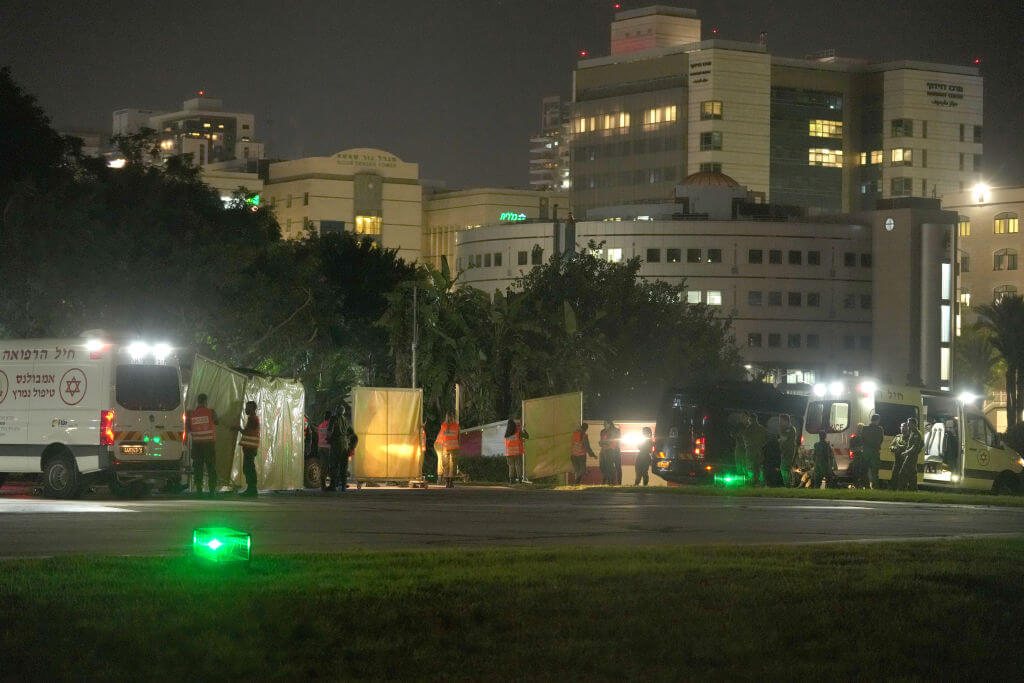Let’s celebrate all freed hostages, not just Israeli citizens
The Thai and Filipino workers released Friday are a reminder this war is a worldwide crisis

Ambulances and emergency workers wait outside Schneider medical center in Petah Tivka, Israel, where some of the released hostages are expected to be brought, on Nov. 24. A total of 50 hostages currently held by Hamas are to be released during a four-day truce with Israel, the first such pause in fighting since Oct. 7. Photo by Erik Marmor/Getty Images
Updated: Thailand’s foreign ministry on Saturday released the names of 10 of its citizens freed on Friday after being held hostage in Gaza since Oct. 7. The ministry, which on Friday initially said that 12 of its citizens were released, also confirmed that 20 others are still being held.
The freed hostages included nine men: Santi Bunphrom, Bunthom Pankhong, Mongkol Phajuabbun, Withun Phumi, Vichai Kalapat, Bancha Kongmani, Buddi Sengbun, Uthai Thunsri, Uthai Sengnual, and one woman, Kanthawri Mulkan. The names were transliterated by The New York Times. Also, the identity of the released Filipino hostage was confirmed as Gelienor “Jimmy” Pacheco by Philippine President Ferdinand Marcos, according to CNN.
By the time you read this, or certainly within hours, the numbers in this report should be outdated.
For that reason — especially if they’re increased — we can all say Baruch HaShem. But let’s not limit our praise for the freeing of 13 Israeli hostages on Friday as part of a deal brokered by the U.S. and Qatar.
Also released in the first of several tranches were 10 or perhaps 12 Thai nationals, according to various news reports, and one Filipino, all of whom had been migrant workers in Israel’s south before Oct. 7. But while CNN and other news outlets rushed to identify the Israelis by name along with their ages — 2 to 85 — and other details, much less information was shared about the freed foreign nationals, though there was video of them on a bus with the released Israeli hostages.
That inconsistency has prevailed throughout the hostage crisis that began with the Hamas terror attack in Israel on Oct. 7. Wildly different reports have tallied as many as half of the roughly 240 hostages to be citizens of 40 countries, including some Israelis with a second citizenship. The estimates of kidnapped Thai nationals alone reported by credible news sources have ranged from 14 to 54. On Friday, a Thai government statement said 12 of its nationals had been released in what it described as “the first batch” but did not confirm a total kidnapped.
The Philippine News Agency did not confirm its country’s freed hostage before 2 p.m. on Friday, but ran a statement only saying that two Filipino nationals were officially counted as missing.
Thai and Filipino victims of the Oct. 7 attack, including those murdered, were among thousands of foreign workers and students in Israel. They have little stake in the Israeli-Palestinian territorial dispute.
The different nations also have different international relationships to help with the negotiations. In its statement, the Thai government thanked the governments of Qatar, Israel, Egypt, Iran and Malaysia — the latter two not likely a party to Israel’s negotiations.
It’s disconcerting to see network news telling virtually nothing about the freed foreign nationals, versus details about the Israelis down to the stuffed animals awaiting the children in their hospital rooms. But I can’t fault them for failing to report on any information they may not yet have. Nor is this to nitpick the lack of exact numbers amid the fog of war, or to condemn any government from fully disclosing everything it knows about the fate of its citizens, even as its own people cry out for more information. I’m sure they have their reasons in such high-stakes negotiations.
Still, the numbers, names and nationalities are human reminders that this war, and political kidnappings everywhere are a worldwide concern, not just Israel’s problem. For news organizations or individuals posting on social media, it’s vital to reflect exactly who is being held against their will in what must be unthinkable conditions, and where they’re from.
That includes anyone miscounted in this morning’s report — who is not just a number, but a human being.





















